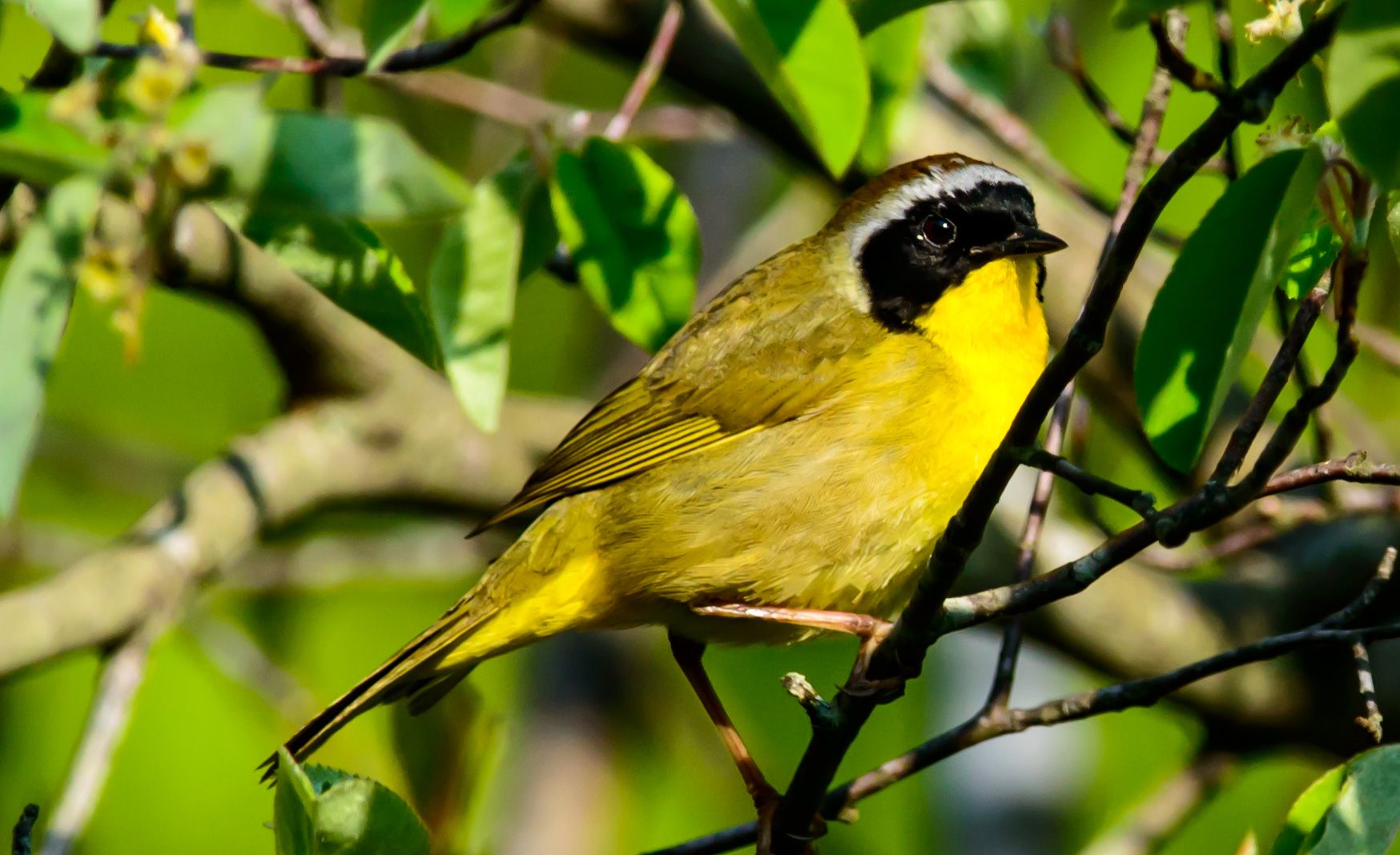
Common Yellowthroat by Ed Hughes
May is the Best Time of Year for Birds and Birders!
Audubon Offers over 30 Guided Birding Walks in May
Birding enthusiasts eagerly await the arrival of colorful songbirds each spring in the Ocean State. These Neotropical migrants include warblers, tanagers, vireos, and others that visit Rhode Island in the summer and head back south for the winter. “It is awe-inspiring that tiny, feathered jewels, like the Ruby-throated Hummingbird which weighs just 4 grams, can make their way from the subtropics to New England and back again every year,” says Lauren Parmelee, Audubon senior director of education. “It is a joy to experience spring migration, when we welcome so many birds back to Southern New England.”
Each year approximately 25 species of warblers can be regularly spotted in Rhode Island, but that number rises if you are lucky enough to observe uncommon or rare species. The Ocean State is not only a summer home to many colorful warblers, but our area also serves as a stopover for several species that are making their way to northern forests. The greatest diversity of spring migrants usually peaks in mid-May, and that’s why many birding enthusiasts refer to this season as their favorite time of the year.
Audubon invites all Rhode Islanders to get out and discover the joy of birding! FREE birding walks are offered throughout the month of May at locations across the state. Novice birders are welcome. Just grab your binoculars, join an Audubon expert, and search for spring migrants on the trails!
Please register online through the Audubon events calendar. Programs are free, but advance registration is required so you can be contacted directly about cancellations.
Sundays
Audubon Caratunk Wildlife Refuge, 301 Brown Ave., Seekonk, Mass. May 4, 11, 18, 25; 7:30-9:30 a.m.
Mondays
The new Providence Crosstown Trail, Providence. May 5, 12, 19, 2025; 12-1 p.m. (Note there is no walk on Memorial Day: May 26, 2025).
Tuesdays
Audubon Claire D. McIntosh Wildlife Refuge, at the Audubon Nature Center and Aquarium, 1401 Hope St., Bristol. May 6, 13, 20, 27, 2025; 8-9 a.m.
Wednesdays
Locations determined weekly, registered participants will be sent details. May 7, 14, 21, 28; 9-11 a.m.
Thursdays
Audubon Marion Eppley Wildlife Refuge, Dugway Bridge Road, West Kingston. May 1, 8, 15, 22, 29; 8-11 a.m.
Audubon Touisset March Wildlife Refuge, 99 Touisset Road, Warren. May 1, 15, 29; 9:30-11:30 a.m.
Audubon Emilie Ruecker Wildlife Refuge, 116 Seapowet Road, Tiverton; May 8, 22; 9:30-11:30 a.m.
Fridays
Audubon Fisherville Brook Wildlife Refuge, 99 Pardon Joslin Road, Exeter; May 2, 9, 16, 23, 30; 8:30–10:30 a.m.
Saturdays
Wings by Sight: Birding for the Hard of Hearing Community. Locations below; 9-11 a.m.
Discover the world of birds through visual cues. Join Audubon for a morning of sight birding designed for beginner birders and the hard of hearing community. Birding techniques focus on identifying feathered friends by sight. Embrace the beauty of birdwatching through a tailored program to enhance your birding skills, making the wonders of avian diversity accessible.
For ages 12-plus. (Note this is not an ASL program).
- May 3: Audubon Parker Woodland Wildlife Refuge, 1670 Maple Valley Road, Coventry.
- May 10: Audubon Fort Wildlife Refuge, 1445 Providence Pike (Route 5), North Smithfield.
- May 17: Audubon Powder Mill Ledges Wildlife Refuge, 12 Sanderson Road, Smithfield.
- May 24: Audubon Caratunk Wildlife Refuge, 301 Brown Ave., Seekonk, Mass.
- May 31: Audubon Maxwell Mays Wildlife Refuge, 2082 Victory Highway, Coventry.

















